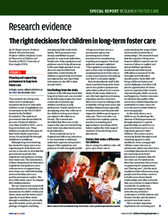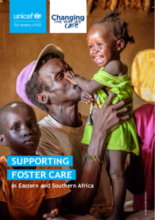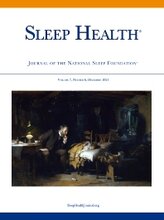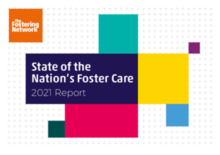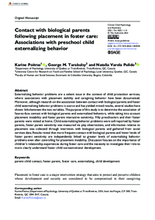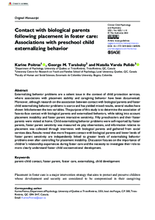Displaying 141 - 150 of 2221
The United States Supreme Court agreed last week to hear a challenge to the Indian Child Welfare Act, a law that has protected American Indian and Alaska Native children, their families and their communities for nearly 50 years. In the interests of vulnerable children — and in light of the cruel history that this law was written to redress — it is vital that the Indian Child Welfare Act be protected and strengthened, not taken apart.
In this video Simon Kanyembo, Director of Social Services at ACE Zambia, addresses the following questions: why child welfare organizations should prefer family-based care to institutional care and response to children who are abandoned or unable to be reintegrated.
This study explored perceptions of Quality Parenting Initiative's (QPI) impact on the foster parent experience, with a particular focus on foster parent involvement in implementation efforts and strengthening stakeholder relationships.
Although long-term fostering has existed for many years as an important part of the foster care service, it was only in 2015 that the government issued the first regulations and guidance on longterm foster care. The introduction of these Department for Education regulations and guidance supports long-term foster care with both kinship and non-kinship carers as a positive permanence option. The aim of this study was to investigate their implementation.
This paper examines the nature and benefits of foster care and identifies some of the key challenges associated with this form of care in Eastern and Southern Africa. It outlines the elements of an enabling environment needed for successful large-scale foster care programmes, including legislation, guidance, changes to social norms, coordination mechanisms, and a strong social service workforce. The paper also provides lessons learnt from the region on how to support each stage of the foster care process.
The goal of this Call to Action is to draw attention to the sleep health of children residing in alternative care settings. It highlights the need for a more robust evidence base to address major knowledge gaps and outline concrete steps toward building future promising sleep health-promoting practices and policies supporting children residing in alternative care settings.
The views and experiences of foster carers and services have been published in a new State of the Nation's Foster Care 2021 report from The Fostering Network. The findings are based on a survey of foster carers and fostering services across the UK.
This webinar, co-hosted with the Martin James Foundation, explores lessons learned in the development and strengthening of foster care systems in a number of countries and contexts, including emerging foster care systems in Bulgaria, Uganda, Cambodia, and Bangladesh as well as the more established foster care system in the UK, with a view to examining challenges and successes in implementation.
The purpose of this study is to determine the association of face-to-face contact with biological parents and externalized behaviors, while taking into account placement instability and foster parent interactive sensitivity.
The purpose of this study is to determine the association of face-to-face contact with biological parents and externalized behaviors, while taking into account placement instability and foster parent interactive sensitivity.

